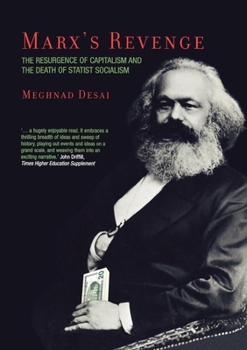Marx's Revenge: The Resurgence of Capitalism and the Death of Statist Socialism
Select Format
Select Condition 
Book Overview
In this provocative and enthusiastically revisionist book, the distinguished economist Meghnad Desai argues that capitalism's recent efflorescence is something Karl Marx anticipated and indeed would, in a certain sense, have welcomed. Capitalism, as Marx understood it, would only reach its limits when it was no longer capable of progress. Desai argues that globalization, in bringing the possibility of open competition on world markets to producers in the Third World, has proved that capitalism is still capable of moving forwards. Marx's Revenge opens with a consideration of the ideas of Adam Smith and Hegel. It proceeds to look at the nuances in the work of Marx himself, and concludes with a survey of more recent economists who studied capitalism and attempted to unravel its secrets, including Joseph Schumpeter, John Maynard Keynes and Friedrich Hayek.
Format:Paperback
Language:English
ISBN:1859844294
ISBN13:9781859844298
Release Date:April 2004
Publisher:Verso
Length:386 Pages
Weight:1.10 lbs.
Dimensions:1.1" x 6.4" x 7.4"
Customer Reviews
2 ratings
Standing Marx on his head
Published by Thriftbooks.com User , 20 years ago
A fun read that attempts to turn Marxian theory on its head to create a pro-capitalist Marx. The book is a good overview of the economic history of the last 200 some years and Marxian economic/poltical theory. My only criticism would be that, I believe he brushed aside Popper's criticisms of Hegel too nonchalantly.
An Admirable Effort--Yet Comes Up Short
Published by Thriftbooks.com User , 22 years ago
Many Leftists, myself included, have spoken against the negative effects that globalization has had on the working classes in both the United States and the Third World. However, if Marx were alive today, what would his position be?In "Marx's Revenge," Meghnad Desai proposes the startling thesis that Marx would support the current phenomenon of globalization. According to Desai, a truly socialist society can develop only when capitalism exhausts itself as a creative and progressive force. As recent events have shown, this has not yet happened. Capitalism is still a productive and vital force for better or worse.Desai supports his thesis by discussing three variants of socialism that arose in the 20th Century: Socialism outside Capitalism (SoC), Socialism within Capitalism (SwC), and Socialism beyond Capitalism (SbC). SoC represents the socialist society that was attempted within the Soviet Union. This version represents the Stalinist "socialism in one country" model which held that socialism and capitalism were destined to compete against each other. The system that was able to produce the most economic benefit to its citizens was to be declared the "winner." However, the corruption endemic in the Soviet system and its inability to produce the surplus capital necessary for economic growth and development led to the demise of this system with the fall of the Soviet Union in 1991.SwC represents the attempt by the developed capitalist nations to develop a "humanized" capitalism with a generous welfare state. This system largely worked from 1945 through the end of the 1960s. However, SwC was made possible only through the widespread Keynesian consensus held by the West after World War II that allowed contries to manipulate domestic financial markets for the funding of domestic programs. With the advent of globalization and the resulting liquidity of international capital, this project was dealt a severe blow beginning in the late 1970s.SbC represents the only true alternative to capitalism. According to Desai, SbC represents a "self-conscious society" that develops when capitalism reaches its limit and can no longer act as a progressive force for the economic betterment of society. What will SbC look like?This leads me to the central criticism of Desai's book. Desai offers an excellent historical overview of the development of the various competing forms of socialism as well as an intricate discussion of Marx's theories of profit and growth as put forth in Das Kapital. However, he has little to say regarding the pragmatic considerations involving what a true socialist society will look like. In fact, the last sentence in "Marx's Revenge" states: "Will there ever be Socialism beyond Capitalism?" (p. 315). This question remains unanswered.To get an idea of what such a society would look like, I recommend reading David Schweickart's book "After Capitalism." Both books are important in that they offer hope that the current late, decadent stage of capital






